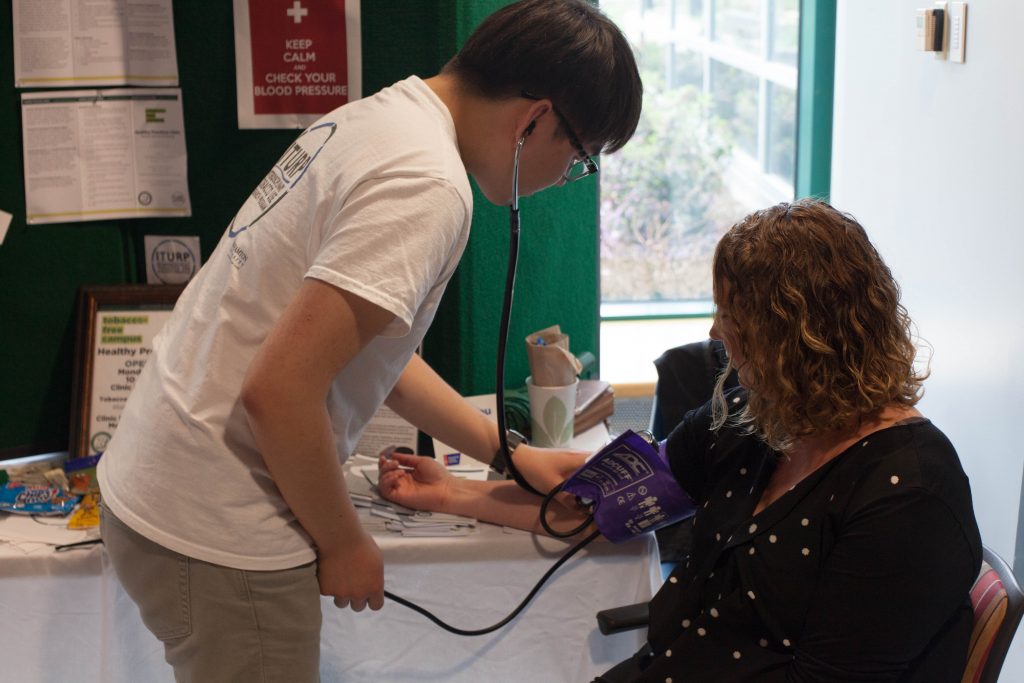Starting on Aug. 1, Binghamton University’s campus will be tobacco-free. For the many students and faculty who will be affected by this change of policy, the Decker School of Nursing is providing a free and confidential clinic to accommodate those dealing with the symptoms of withdrawal.
The ban, announced in May 2016, prohibits the use or sale of tobacco or tobacco-derived products on any University owned, operated or leased property, including cigarettes and electronic cigarettes. The policy states that it will serve as a means to promote the health, well-being and safety of students, faculty, staff and visitors at the University.
BU’s Healthy Practices Clinic, located in Academic Building B Room 331 and available for scheduled and walk-in appointments on Mondays and Thursdays, was derived from the Decker School of Nursing’s Interdisciplinary Tobacco Use Research Program (ITURP). Geraldine Britton, an assistant professor of nursing and the director of ITURP, said that the program aims to help decrease tobacco use, especially as the popularity of alternative forms is rising.
“Our mission really is to empower individuals toward making informed health decisions, promote a healthier lifestyle, increase public awareness regarding tobacco use, especially now on campus with e-cigarettes and hookah,” Britton said.
The clinic is the first to service employees on campus and is run primarily by nurse practitioners employed by the University. While the clinic will focus on patient education, it will also offer health assessments, nicotine replacement therapy and cessation counseling for those who choose to quit smoking.
Tim Leonard, a nurse practitioner at the clinic, senior staff assistant and graduate clinical site coordinator, said that the clinic provides a space in which patients can find confidential and accessible treatment.
“Our goal is not to be punitive or judgmental, we just want to be in a supportive role to be able to provide one-on-one services to clients and be able to help them understand what the risk of those types of behaviors are and how can they best manage to get through the day by perhaps doing alternative methods,” Leonard said.
Jae Chung, a junior double-majoring in psychology and nursing, worked in ITURP for three semesters before becoming one of the first undergraduates to assist in the creation of the clinic.
While a survey of students conducted by the Decker School of Nursing indicated that 20.8 percent of students reported smoking a cigarette within the past month, Chung said that students are less likely to seek help due to the popularity of tobacco use in social situations.
“How we see the whole tobacco use on campus right at the moment is a lot of the faculty are more likely to use cigarettes for a longer amount of time than undergraduate students and even graduate students,” Chung said. “We think that undergraduates are more likely to be a social smoker, or a casual smoker, and then are more likely to consider themselves a nonsmoker and therefore less likely to seek out help.”
The clinic will support the policies set in place by the new tobacco-free campus policy. Britton said that she has been involved with the background of this initiative for many years and has included that prior knowledge in the direction of the clinic.
“That was our first goal — to align ourselves with the tobacco-free policy and that we would help that,” Britton said. “At the same time, realizing that tobacco is an addiction and that it really is a disease and we have to support that.”
According to Leonard, the clinic was first thought of as a place for research and data collection on campus for use in ITURP, but has now grown to become a part of the Decker School of Nursing’s vision for a community clinic.
In line with Dean Mario Ortiz’s vision for the school, a nurse-managed clinic servicing the community would be available at the new facilities located in Johnson City. This would provide graduate nurse practitioner students a new place to complete their required clinical hours, research and active-learning opportunities for undergraduates.
According to Britton, who is also leading the redesigning of the Kresge Center for Nursing Research at BU to include an arm dedicated to healthy practices, the researchers will expand their spectrum of data to more than just tobacco-related addictions, adding to their knowledge of healthy lifestyles.



